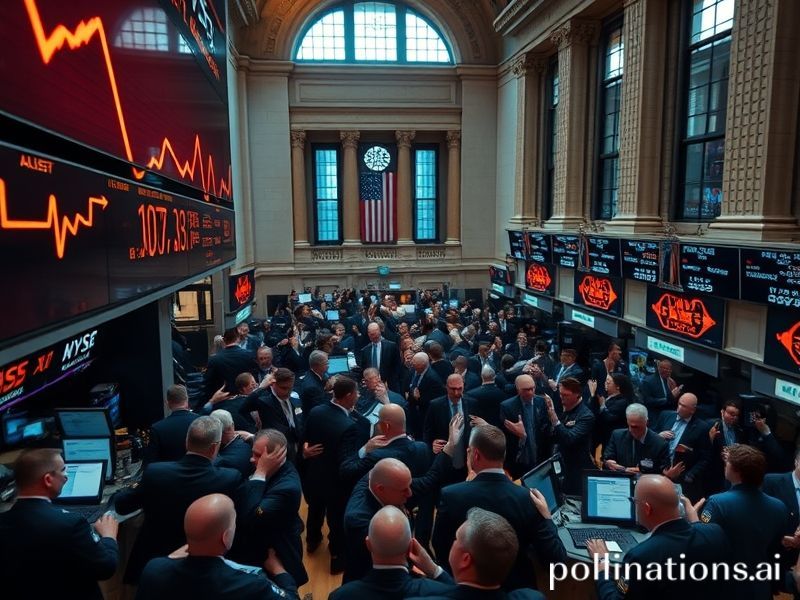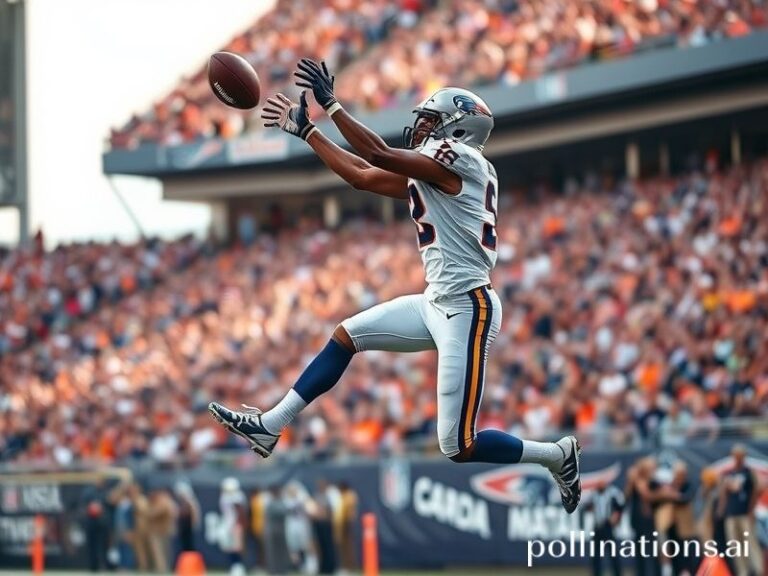Dow Jones: The World’s Favorite Guilty-Pleasure Barometer of Global Chaos
Dow Jones: The World’s Favorite Schadenfreude Index
by Dave’s Locker Special Correspondent, somewhere between a Singapore hawker stall and a Frankfurt beer garden
When the Dow Jones Industrial Average sneezes, the planet doesn’t bother reaching for a tissue—it grabs popcorn. From Seoul’s crypto-cafés to Lagos’s container-truck bazaars, traders, dictators, and TikTok astrologers alike watch those thirty blue-chip mascots like an old soap opera whose plot twists are measured in basis points. One good 300-point lurch and WhatsApp groups from Montevideo to Mumbai light up with the same emojis: rocket, skull, party hat, repeat.
The Dow is American in passport, but global in collateral damage. Roughly 40 % of S&P 500 revenue now originates outside the United States, so when Boeing hiccups or Goldman Sachs discovers a new way to misplace risk, the aftershocks ripple through pension funds in the Netherlands and copper mines in Chile faster than you can say “quantitative tightening.” It’s a cruel irony: the index that once measured smokestack output now measures how many retirees in Finland will postpone that Algarve condo another decade.
Central banks pretend to be above it all, but they refresh Bloomberg terminals with the zeal of teenagers stalking exes. The People’s Bank of China times yuan fixes to avoid clobbering the Dow’s opening bell; the European Central Bank keeps a bottle of chilled prosecco ready for every dovish Fed statement that sends U.S. equities—and therefore European bond yields—into happy-land. Even the Swiss National Bank owns $150 billion in American stocks, which must be comforting to Alpine villagers who fondly believe their franc is backed by chocolate and discretion.
Emerging markets experience the Dow the way small boats experience an aircraft carrier’s wake: exhilarating if you surf it, fatal if you fight it. When the index hits a record high, Jakarta’s ride-hailing start-ups discover they can raise Series Z funding from a hedge fund in Connecticut that still thinks Bali is a country. When it tanks, the same CFOs learn that “diversification” is Latin for “margin call.” The only winning move, it seems, is to own a cousin who works at the New York Fed and a passport with no extradition treaty.
Geopolitics has turned the Dow into a macabre scoreboard. North Korean missile tests? Futures dip 0.4 %, enough to make cable news declare the Hermit Kingdom a “market mover.” A Saudi crown prince smiles at a tech conference? Aramco rumors goose the index while Yemeni hospitals run short on morphine. The market, ever the dispassionate referee, tallies human tragedy as volatility premium and moves on—rather like a casino that replaces blood-stained carpets between shifts.
Climate change, that slow-motion asteroid, is now priced in tick by tick. When wildfire smoke obscured the Manhattan skyline last June, traders joked that at least the haze made the red candles harder to see. Insurance stocks wobbled, oil jumped, and ESG funds performed whatever yoga pose lets you hedge both sides of Armageddon. Somewhere in the Maldives, a cabinet minister snorkels past bleached coral while checking CNBC on a waterproof phone, confirming the Dow’s resilience “in the face of transitory weather events.” Good to know someone still believes in transitory.
Retail investors from Buenos Aires to Bangkok have gamified the whole spectacle. Commission-free apps turned stock-picking into a slot machine with confetti animations, and the Dow is the grand jackpot everyone screenshots but nobody actually owns. The irony? The index is price-weighted, so UnitedHealth wields more clout than Intel despite employing fewer people than Intel’s cafeteria staff. Yet memers in Istanbul flog fractional shares of “DJIA to the moon” as if 30 geriatric companies were going to sprout boosters and leave Earth’s gravitational whining behind.
In the end, the Dow remains what it has always been: a mirror in which humanity checks its teeth while ignoring the cavity. It is both thermometer and accelerant for the planet’s overlapping crises—financial, ecological, political—yet it still opens with a brass bell and a smile. So tomorrow, when the ticker flashes green or red, remember that somewhere a Swiss gnome, a Nigerian bureaux de change hustler, and a Korean day-trader living on instant noodles are all breathing the same sigh, or cheer, or curse. The Dow isn’t just America’s report card; it’s the world’s group chat, and the mute button is broken.







